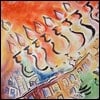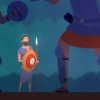Nir walked into our Chabad House in Kathmandu, Nepal, with the flowing robes of a Buddhist monk. His head was shaven and his arms were bare. His eyes turned to survey the scene: The people milling about on the couches, sitting at the computers, eating at the kosher restaurant and those in the synagogue. “I didn’t come here to tour. I’m actually looking for something else,” he said passionately.
“I’ve come to fulfill my years-old dream.”
Tripping over his crimson robes, he tells anyone who’ll listen that he’s going away for 10 weeks to learn to pray and meditate at the famous Kopan Buddhist monastery. The monastery is east of us, overlooking the Kathmandu Valley. Several hundred monks live there with very basic living conditions.
“I called them from Israel to tell them I’m coming,” he says. “I’m setting out early tomorrow morning. I want to become an integral part of the group of monks there.” He looks at us from the corner of his eye, seeing how we’ll react.
My husband, Chezki, and I smile at him and offer him to join us on the couches for our nightly class. Nir declines with a shy smile.
But Nir feels tired. The guest house where he’s staying is already closed for the night … . His feet are hurting a little … maybe he’ll just make himself a cup of tea … .
The class begins and Nir, cup of tea in hand, finds himself coming closer and closer. He isn’t joining a class on Chassidic thought. He’s just waiting for his tea to cool down … .
Tonight we’re learning chapter 32 of Tanya with the group of mostly Israeli backpackers in the Chabad House. We’re talking about the strong connection between one Jewish soul and another. “Therefore, all Israelites are called real brothers by virtue of the source of their souls in the One G‑d; only the bodies are separated … ”
We talk about the responsibility we have to one another, wherever we may be and how every Jew has a mission. Our job is to give from ourselves to another. What you have, share with your brother.
Nir sits down on the couch, but who knows, maybe it’s just his aching feet.
Before he leaves, we remind him that Chanukah is in a week. We send him off with a menorah and candles kit, plus another in case it’ll come in handy … . We give him our cell phone number if he wants to talk from the monastery. We’re here for him.
A year passed by. It’s the first night of Chanukah.
The Chabad House is festive and decorated. The smell of doughnuts wafts from the kitchen; they wink at us with their jelly eyes. The giant menorah stands in the center. Hundreds of backpackers and community members are waiting for the blessing to be recited and the menorah kindled.
A young man makes his way over to us from the entrance. “Do you remember me?” He’s wearing blue jeans and a white button-down shirt. Nir.
“How are you?” he asks us. “I’ve been traveling the Far East for a year now. For the last months, I was based in India, but I decided that Chanukah I will be with you. I have something special to tell you,” he says animatedly.
“I feel this is an opportunity to come full circle. It’s Chanukah in a moment. Nothing more symbolic than that … .” He asks us to come to the side with him.
The courses at the Kopan monastery were interesting, but nothing more. He didn’t connect with everything but decided to stay there until the end of the period he’d planned on being there for.
Several days after arriving, he noticed a quiet monk with a Western complexion in another wing of the monastery. He began talking to him and to his surprise, the monk answered him in fluent Hebrew. He said his name was Eitan, and he’s been there for several months already. Eitan arrived at the monastery straight from the airport in Kathmandu. Long before his flight east, he found out where his fellow Israelis gathered—the Chabad House in Kathmandu—and vowed to never go there.
His soul was seeking quiet and serenity.
He would spend the coming years at Kopan and disconnect from everything.
His anxious parents.
His friends, who aren’t true friends.
His life, dotted with question marks but not a single exclamation mark.
He would find the answers in Buddhism.
This is why he was here in this monastery, and where he would find satisfaction and meaning.
Two days later, Nir was sitting in his room and staring at the menorah he’d received from us at the Chabad House a week earlier. The things he’d heard that night were still ringing in his ears.
What was the worst thing that would happen if he’d light it? He wouldn’t become religious or anything, right?
In a moment’s decision, he ran to Eitan’s room and knocked on the door. Eitan was in a deep meditative state when Nir burst inside. “Tonight is the first night of Chanukah!” Nir exclaimed. “You’re Jewish, I’m Jewish, let’s light together!” Eitan looked at him bemusedly, but it didn’t move Nir. In his head were the words of chapter 32 of Tanya. Eitan is Jewish and is his brother. And what he has to give him is the menorah he got at Chabad.
He took the two menorahs out of his bag and gave Eitan a page with the blessings. “Let’s brighten the world!” he told Eitan.
Eitan looked at him and was quiet for several moments.
They lit the menorah together, and then they were joined by Laurie, a girl from the next room. She was doing a course on self-control at the monastery. She told them she’s Jewish too, from Holland. Quietly, Nir shared what he’d learned at the Chabad House.
Laurie was crying. She asked Nir many questions, to which he doesn’t have the answers.
Eitan had no questions. He was just listening.
Later, when Nir got tired, he fell asleep, fully dressed, on Eitan's bed. When he awoke a little later, he found Eitan leaning on the windowsill gazing at the candles, his entire body trembling.
For the next week, Eitan walked around the monastery in a daze until one day he picked up his backpack and left.
“A month ago, I got an email from him,” Nir tells us. “He told me his entire life changed because of the menorah.” He blushes. “He thanked me for being the one to light his fire. He said I gave him strength. I gave him meaning. That the flames of the menorah brought him back home. To his family. To his friends. To his heritage.”
Nir smiled and asked if we could learn that chapter of Tanya again about the responsibility that every Jew shares for his brother.
And another doughnut please, with lots of jelly.








Join the Discussion